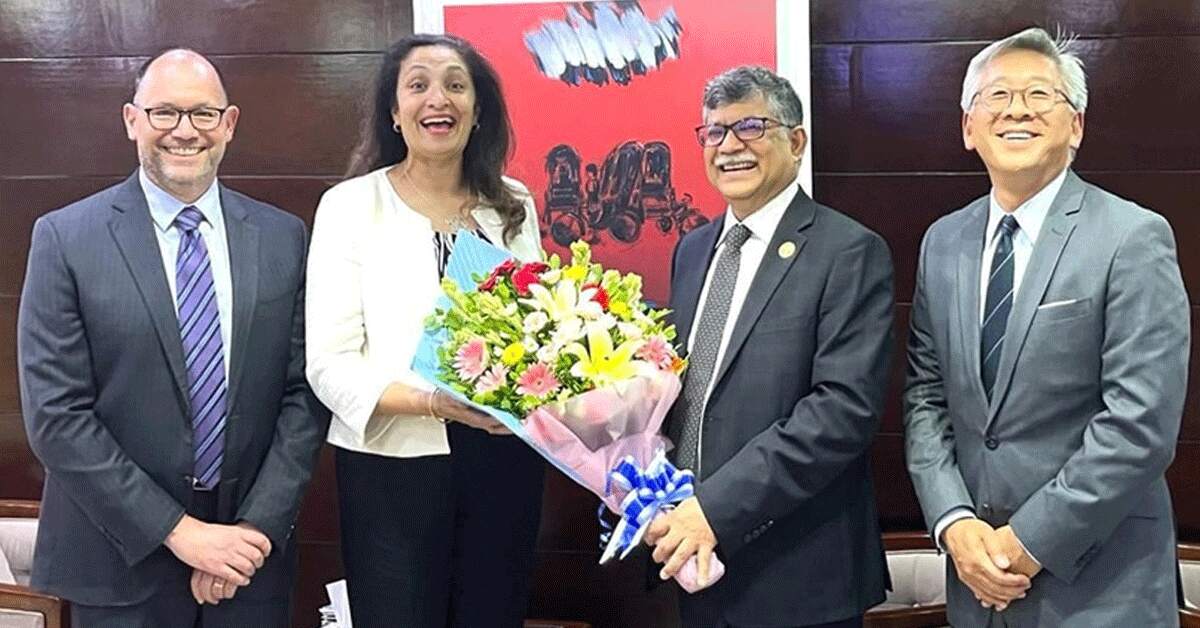
US Undersecretary Uzra Jaya, who is visiting Bangladesh, has asked about the rights and legal protection of workers and human rights workers in Bangladesh’s garment sector. At the same time, he wanted to know about the security and safety situation of Bangladeshi media and the members of Hill ethnic groups. He wants to know about these issues in a meeting with a five-member delegation of the country’s civil society, labor organizations, and minority ethnic groups at the American Club in Gulshaan in the capital on Thursday afternoon.
Assistant Secretary of State for South and Central Asia Donald Lu and US Ambassador to Bangladesh Peter Haas attended the meeting with Uzra Zeya, Undersecretary for Civilian Security, Democracy and Human Rights of the US Department of State. The meeting was attended on behalf of various organizations of Bangladesh by Bangladesh Environmental Lawyers Association-Bella Chief Executive Syeda Rizwana Hasan, Center for Governance Studies (CGS) Executive Director and television talk show third-level host Zillur Rahman, Bangladesh Garments and Industrial Workers Federation President Kalpana Akhter, Chakma Rani. Yen Yen and the NGO Solidarity Center Bangladesh Country Program Director AKM Nasim.
At the event, Uzra Zeya wants to know about the working environment and problems of the rights activists in Bangladesh. Want to hear their views on the impact of the US visa policy.
In response, Syeda Rizwana Hasan said that the debates and criticisms that have arisen on the visa ban will be applied to those who will obstruct the fair elections. Those who are working for a good election have nothing to fear.
Regarding the human rights situation in the country, Rizwana Hasan said that opposing the government’s development statement is called opposition to the state in many cases, which is not even a criticism of the government, but even if a specific project is criticized, it is seen as a criticism of the government. He opined that such sensitive behavior is creating obstacles in the work of the country’s rights activists.
Zillur Rahman highlighted the implementation of the Digital Security Act and the resulting situation in the way of media expression. He said that the law minister is talking about amending the law by next September. But the government can do it now if it wants. What is the need to take so much time, he asked.
Zillur Rahman commented that it is possible to solve many problems related to the rule of law and other issues in the country through an inclusive election.
On the night of June 25 before Eid-ul-Azha, labor leader Shahidul Islam was killed while going to a garment factory in Tongi, Gazipur to collect the due wages of the workers.
In response to a question about this, the president of his organization, Kalpana Akhter, said that through such killings, an atmosphere of fear is being created among the workers, so that they are afraid to speak about their rights. He alleged that most of the labor organizations in the country were created by the owners and they were working for the interests of the owners as ‘yellow organizations’. Kalpana Akhter said, because of these organizations, the workers are not able to highlight their rights issues.
About the right of workers to organize, AKM Nasim said, if workers form a trade union, they are fired. When they sought redressal from the labor department of the government, it took four to five years for the legal process to be completed. Such a long history makes workers afraid to organize and speak up for their rights. AKM Nasim commented that the country’s labor law needs to be changed for legal protection in these matters.
Chakma Rani Yen Yen talks about the status of small ethnic groups in the Chittagong Hill Tracts. According to him, the real condition of the mountain is not being revealed in the mainstream media of the country. He commented that the government needs to take the initiative to bring them before everyone.